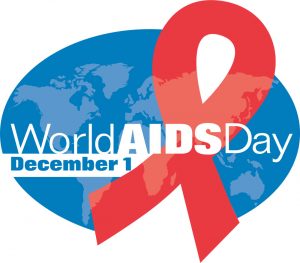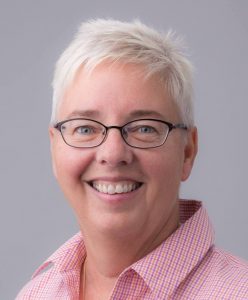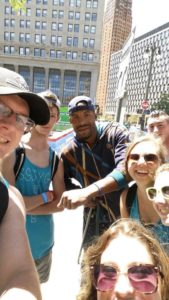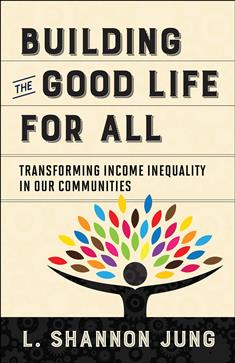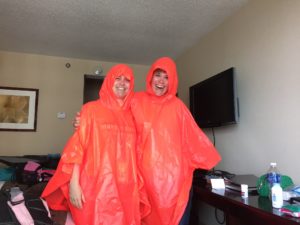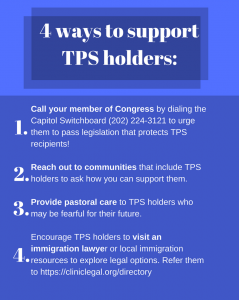On Tuesday, October 31, rostered ministers of the Saint Paul Area Synod & Minneapolis Area Synod, ELCA joined together in commemoration of the 500th Anniversary of the Reformation. The theme for the day, Turning 501, we examined the question, “What Does the Church Need to be Passionate About As the Reformation Turns 501?” Six speakers from across this synod – theologians, professors, artists, & even a former bishop – challenged us to approach this question through a new lens and with wider scope. I , Rev. Jen Collins from the Saint Paul Area Synod was one of those six speakers. Having recently attended and completed the Transforming White Privilege (TWP): A 21st Century Leadership Capacity training in Chicago with other ELCA affiliated members, this laid the groundwork for reflection and envisioning the answer to the proposed question. “What does the church need to be passionate about?”
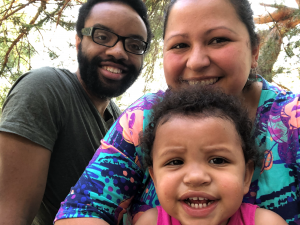
You see, I am a Latina who grew up in the southwestern desert in Albuquerque, New Mexico and has since then traveled all over this nation. Minnesota being my home since 2010 where I’ve attended seminary, met my now husband and have the most incredible daughter. We have a wonderful array of culture and heritage within our small family which is why I am so passionate about sharing my story and adding my colorful voice to the sea of many white ones within our ELCA church. Being “Lutheran” is more than whiteness.
An answer to a question:
Greetings to you my family in Christ.
I am so elated and on fire to share with you a vision I believe the church should be passionate about as us Lutherans turn 501. We just celebrated on Sunday this the Reformation- the congregation I serve had 12 young people stand before the community and affirm that God chose them- that they are the next set of reformers to help us shape God’s church.
We though. Those of us here and in our communities, are reformers too! When I was ordained just a couple of years ago, I was taking on two calls at the same time. My half African American, half Latina daughter, Faora blessed our lives. Faora was just barely a month old when I became a mother and a pastor. These calls have been intimately intertwined and have changed everything- the past couple years have been challenging in both my roles. The world’s climate has not been a breeze– if anything it’s been an ever-changing storm. I’ve have never felt so much heart ache – too many black bodies, night clubs and concerts, immigrants, refugees, #allarewelcome, hurricanes, #metoos, fake news, #hatehasnohomehere and most days I don’t even want to know what’s next. I pray that my African-American husband makes it home, I pray my family or others- are not harmed, judged, persecuted, marginalized just for the shade of skin God has gifted us.
God has shaken me, I’m now woke; meaning – I have been made aware of internal and external injustices constructed and uplifted by individuals, systems and institutions. I’ve been thinking and rethinking for myself, woke to the injustices my multi-ethnic family has endured. It is my prayer that the Lutheran Church, that the whole church of God becomes woke and stays woke to the racism and privilege that our- yes, our Lutheran Church has allowed to cultivate in the pews, in our seminaries and in the pulpit. We’ve reinforced stereotypes and limit who is “Lutheran” and who is not. We keep making cultural assumptions which continue to advantage some groups and disadvantage others.
In 501, we should be passionate and strive for EVERY member of the church to be aware of and respect all the voices in the room, not just the most evident or numerous.
We have a need, an urgency and commitment to God and our children that when we say, we are the ELCA Lutheran Church it means we are about the Reformer who changed it all- Jesus. The Word became flesh- a colorful, wonderfully made brown body, a middle eastern Jew that God embodied. Jesus is not a white savior- is not a dusty blonde with flowing locks, not a white European! Our mighty reformer, Jesus challenges us – invites us to tell the right story not a white story. To re-frame the narrative so, the whole church can honestly be welcoming, where ALL God’s people are valued, beloved creations. We are the church in 501. Germans- Swedes- Norwegians- White Europeans are not the only one’s who write the narrative about what it means to be Lutheran!
Jesus shows us we are to reform the world so children- black, brown, indigenous are not seen as less than, second-class, dangerous or a commodity to be used. We NEED to speak – We NEED to stop being silent. We need to be the beacon of hope this world needs. Luther said- “our office involves much toil and work, many dangers and attacks, and in addition to little reward or gratitude in this world. But, Jesus will be our reward, so long as we labor faithfully.” Being silent for fear of backlash, intimidation, ignorance, loss of employment at the utterance of “Black Lives Matters”- Taking a knee- support of LGBTQIA community – anything deemed “political” – not talking, that is being unfaithful to the gospel.
Will we just have to wait another 500 years to consider reforming?
Now is the time. Did Jesus wait? Jesus rocked the boat- stretching the imaginations of God’s people from the beginning and still this day as Lutherans enter 501. Do you see it- Jesus schooled sin, death and the devil to keep setting the marginalized, and demonized victims FREE. Jesus pardons the prisoners and crosses ethnic and cultural lines, so people will SEE. Jesus changes lives- every life is SEEN, every life – every shade of flesh is VALUED- RESPECTED-DEEMED BEAUTIFUL- filled with Grace! Every life is worth the cost– Jesus endured being slapped around, insulted, assaulted, named “criminal” and led off to the cross- to breath his last breath but not for a loss.
Jesus endured for us – body and blood for us. Jesus rose for us- THIS IS GREAT, REFORMING, LIFE-CHANGING NEWS! We respond because what Jesus has done! We are reformers- called, gathered and sent by the Spirit- she helps us bring hope, love and life to a broken and sinful world. So that one day as Dr. King envisioned, my daughter, will not be judged by the color of her skin but by her heart, whose she is, as was dreamed just some 54 years ago.
In 501, let’s Reclaim Jesus. Reform Lutheranism. Renew Hope.
This is my passion and NEEDS to be our passion. This work is HARD and challenging but if we do not do the deep and investigative work within ourselves and with each other – then we aren’t being faithful to the gospel. We all – people of color and white folks have got to open ourselves up to talk productively about racial equity, take ACTION to address whiteness- the dominant culture narrative, privilege and the consequences. It is a goal to utilize this TWP Leadership Capacity to accomplish the ideas stated above. This program will be a monumental tool for our Synods, churches and communities. Let’s keep moving forward in 501 – be motivated!
#Reformation501 #DecolonizeLutheranism #Blacklivesmatter #TransformingWhitePrivilege
